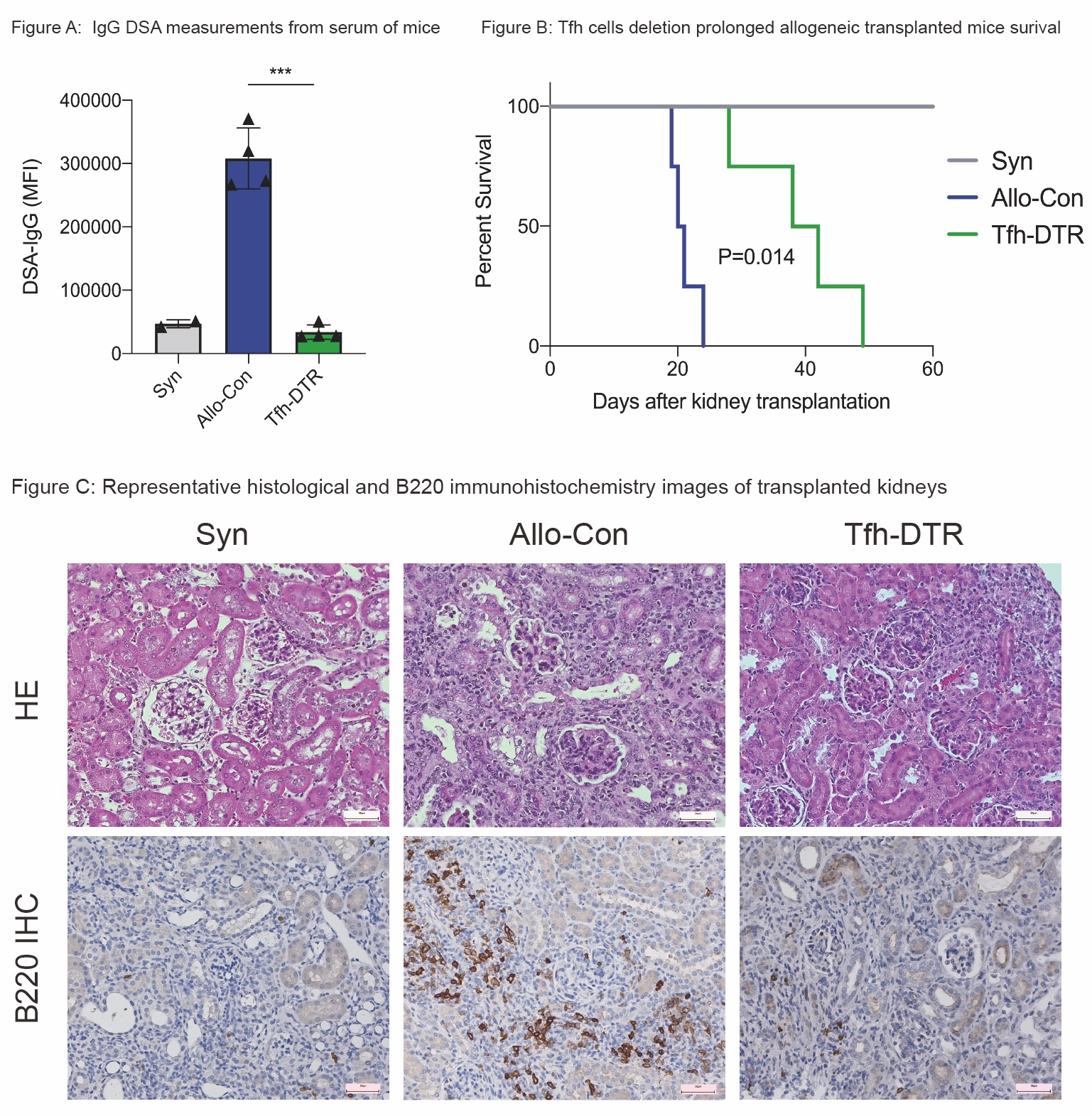The Roles of Intrarenal B Cells in Regulating Antibody Mediated Rejection After Kidney Transplantation
H. Zhang1, C. Cavazzoni1, E. Bechu1, B. Hanson1, M. A. Podestà1, D. Kreisel2, A. Alessandrini3, P. Sage1
1Transplantation Research Center, Renal Division, Brigham and Women’s Hospital, Harvard Medical School, Boston, MA, 2Department of Surgery, Washington University in St Louis, St. Louis, MO, 3Center for Transplantation Sciences, Department of Surgery, Massachusetts General Hospital, Harvard, Boston, MA
Meeting: 2022 American Transplant Congress
Abstract number: 284
Keywords: B cells, Graft-infiltrating lymphocytes, Kidney transplantation, Rejection
Topic: Basic Science » Basic Science » 04 - B-cell / Antibody /Autoimmunity
Session Information
Session Name: B-cell / Antibody /Autoimmunity
Session Type: Rapid Fire Oral Abstract
Date: Monday, June 6, 2022
Session Time: 3:30pm-5:00pm
 Presentation Time: 4:20pm-4:30pm
Presentation Time: 4:20pm-4:30pm
Location: Hynes Room 310
*Purpose: Alloimmune rejection after kidney transplantation is associated with substantial infiltration of immune cells such as T and B cells in transplanted grafts. However, the origins and functional interactions of these cells are incompletely understood. Here, we will explore how follicular T cells control intrarenal B cells response during antibody-mediated rejection (ABMR).
*Methods: A life-sustaining allogeneic kidney transplantation model in mice was used to study intrarenal B cells in the settings of mixed cellular and humoral rejection. Intrarenal and draining lymph node (LN) B cells were analyzed by RNA-seq and BCR-seq to investigate transcriptional programming, clonal expansion and somatic hypermutation. In vitro functional experiments were performed to assess the functional capacity of intrarenal B cells to promote effector T cell responses. Lastly, the roles of Tfh cells in controlling intrarenal B cell responses were assessed using Tfh-deleter mice.
*Results: We found allogeneic kidney transplantation in mice generated a mixed TCMR/ABMR process leading to rejection on day 20. Rejection accompanied substantial Tfh and effector B cell responses in draining lymph nodes as well as T and B cell infiltration in rejecting kidneys. Deletion of Tfh cells post-transplantation resulted in attenuated donor-specific antibody, less rejection of pathological damage and an increase in survival (20.5 vs. 40 days). RNA-seq revealed a unique transcriptional profile in intrarenal B cells, which was distinct from LN germinal center B cells. BCR sequencing further demonstrated a unique origin of intrarenal B cells compared to effector LN B cells. Lastly, we show that Tfh cells are able to control B cell responses in both LN and kidney to control ABMR.
*Conclusions: These studies demonstrate that Tfh cells promote ABMR by controlling B cell responses in multiple tissues after kidney transplantation. Targeting these cells may offer a new therapeutic strategy to prevent and treat ABMR.
To cite this abstract in AMA style:
Zhang H, Cavazzoni C, Bechu E, Hanson B, Podestà MA, Kreisel D, Alessandrini A, Sage P. The Roles of Intrarenal B Cells in Regulating Antibody Mediated Rejection After Kidney Transplantation [abstract]. Am J Transplant. 2022; 22 (suppl 3). https://atcmeetingabstracts.com/abstract/the-roles-of-intrarenal-b-cells-in-regulating-antibody-mediated-rejection-after-kidney-transplantation/. Accessed February 9, 2026.« Back to 2022 American Transplant Congress

